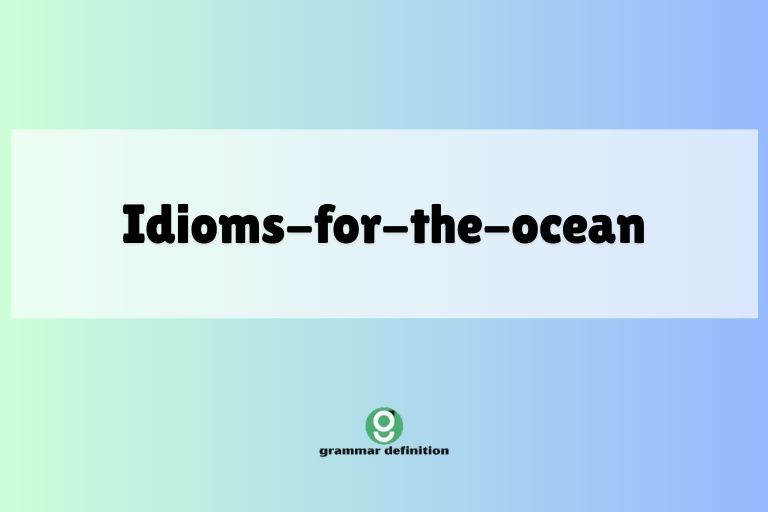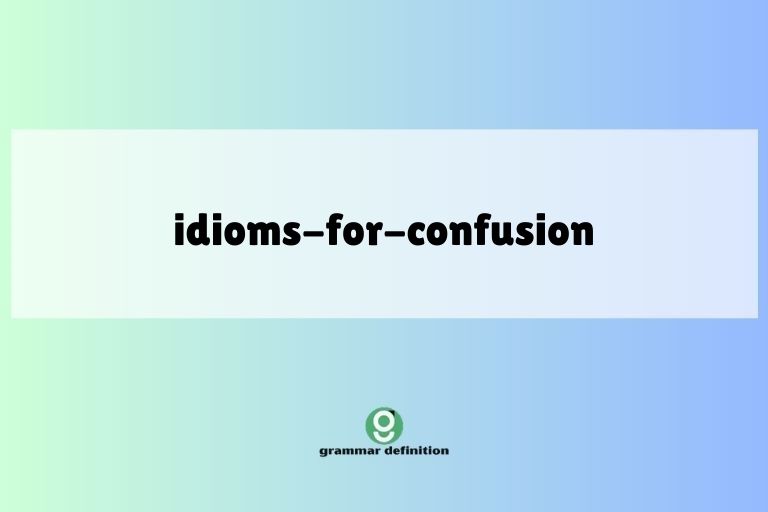Ocean Idioms: Riding the Waves of Figurative Language

Idioms are a fascinating part of the English language, adding color and depth to our conversations. Ocean-related idioms, in particular, are rich with imagery and symbolism, drawing on the vastness, power, and mystery of the sea.
Understanding these idioms can significantly enhance your comprehension and fluency in English, allowing you to express yourself more creatively and connect with native speakers on a deeper level. This article will explore a wide range of ocean idioms, providing definitions, examples, and practice exercises to help you master their usage.
This comprehensive guide is perfect for English language learners, teachers, and anyone interested in expanding their knowledge of figurative language.
Whether you’re a beginner or an advanced learner, diving into the world of ocean idioms will not only improve your language skills but also offer a glimpse into the cultural significance of the sea. By the end of this article, you’ll be able to confidently use these idioms in your everyday communication and appreciate the artistry behind their creation.
Table of Contents
- Introduction
- Definition of Idioms
- Structural Breakdown of Idioms
- Types and Categories of Ocean Idioms
- Examples of Ocean Idioms
- Usage Rules for Ocean Idioms
- Common Mistakes When Using Ocean Idioms
- Practice Exercises
- Advanced Topics: The Nuances of Idiomatic Usage
- Frequently Asked Questions
- Conclusion
Definition of Idioms
An idiom is a phrase or expression whose meaning cannot be understood from the literal meanings of the individual words it contains. Instead, it carries a figurative or non-literal meaning that is specific to a particular language or culture.
Idioms are a crucial part of mastering any language, as they reflect the cultural nuances and historical context of that language.
Idioms can be classified based on their grammatical structure, origin, or thematic content. They function as a single unit of meaning within a sentence, often adding emphasis, humor, or a more vivid description.
For example, the idiom “to be in deep water” doesn’t literally mean being submerged in water; it means being in a difficult or problematic situation.
Understanding idioms requires familiarity with the cultural context in which they are used. While some idioms may have similar counterparts in other languages, their specific wording and connotations can vary significantly.
Therefore, learning idioms involves more than just memorizing definitions; it requires understanding their cultural roots and usage patterns.
Structural Breakdown of Idioms
The structure of idioms can vary widely, ranging from simple phrases to complex sentences. Some idioms are verb phrases (e.g., “rock the boat”), while others are noun phrases (e.g., “a drop in the ocean”) or prepositional phrases (e.g., “all at sea”).
Regardless of their grammatical structure, idioms function as a single semantic unit.
Idioms often contain metaphorical or figurative language, drawing on imagery and symbolism to convey their meaning. For example, the idiom “smooth sailing” uses the image of a calm sea to represent an easy and trouble-free experience.
The effectiveness of an idiom lies in its ability to evoke a particular image or feeling in the listener’s mind.
It’s important to note that idioms are generally fixed expressions, meaning that their wording cannot be changed without altering their meaning or making them nonsensical. While some idioms may have slight variations, these are usually limited and well-established within the language.
Trying to rephrase an idiom can often result in confusion or miscommunication.
Types and Categories of Ocean Idioms
Ocean idioms can be categorized based on the specific aspects of the ocean they relate to. These categories help to organize and understand the various meanings and connotations associated with these expressions.
Here are some common categories:
Idioms Related to Size and Vastness
These idioms emphasize the immense scale and limitlessness of the ocean, often used to describe something that is overwhelming, insignificant, or abundant.
Idioms Related to Depth and Mystery
These idioms focus on the hidden and unknown aspects of the ocean, suggesting complexity, secrets, or things that are not easily understood.
Idioms Related to Danger and Unpredictability
These idioms highlight the potential risks and uncertainties associated with the ocean, often used to describe situations that are perilous, unstable, or unpredictable.
Idioms Related to Calmness and Tranquility
These idioms evoke the serene and peaceful aspects of the ocean, often used to describe situations that are relaxed, harmonious, or free from stress.
Examples of Ocean Idioms
The following tables provide a wide range of examples of ocean idioms, categorized according to the themes discussed above. Each example includes the idiom, its meaning, and a sentence illustrating its usage.
Examples: Size and Vastness
This table showcases idioms that emphasize the immensity and abundance associated with the ocean, often used to describe situations or quantities that are vast or overwhelming.
| Idiom | Meaning | Example Sentence |
|---|---|---|
| A drop in the ocean | A very small amount compared to what is needed | The money we raised was just a drop in the ocean compared to the total cost. |
| An ocean of something | A very large amount or quantity of something | There was an ocean of paperwork to complete before the deadline. |
| The world is your oyster | You have many opportunities available to you | After graduating from college, the world is your oyster. |
| A sea of faces | A large crowd of people | The speaker looked out at a sea of faces in the audience. |
| Lost at sea | Feeling confused, disoriented, or overwhelmed | Without a map, we were lost at sea in the unfamiliar city. |
| A sea change | A major or fundamental transformation | The new management brought about a sea change in the company’s culture. |
| A vast expanse | A large and open area | They gazed out at the vast expanse of the Pacific Ocean. |
| Like water off a duck’s back | Having no effect on someone | Criticism rolls off him like water off a duck’s back. |
| Swim against the tide | Go against popular opinion or the general trend | He decided to swim against the tide and start his own business. |
| In the wake of | Following after, as a result of | In the wake of the storm, many trees were uprooted. |
| A tidal wave of emotion | An overwhelming surge of feeling | She was overcome by a tidal wave of emotion when she saw her family. |
| As deep as the ocean | Extremely profound or extensive | Her love for her children is as deep as the ocean. |
| To sail into the sunset | To retire and live happily ever after | After a long career, they decided to sail into the sunset. |
| A bottomless pit | Something that seems to require endless resources | The project became a bottomless pit, consuming all our funds. |
| A wide berth | A safe distance | We gave the dangerous neighborhood a wide berth. |
| Inundated with | Overwhelmed with a large quantity of something | The office was inundated with calls after the announcement. |
| The tip of the iceberg | Only a small part of a larger problem | The reported cases are just the tip of the iceberg. |
| To be adrift | To be without direction or purpose | After losing his job, he felt adrift and uncertain about the future. |
| Gone overboard | To have gone too far or been excessive | He went overboard with the decorations for the party. |
| To bail out | To rescue someone or something from a difficult situation | The government had to bail out the failing bank. |
| Plunge into | To start something with enthusiasm | She decided to plunge into the project with all her energy. |
| The floodgates opened | Unlimited or excessive amounts | Once the news broke, the floodgates opened, and everyone wanted to talk about it. |
Examples: Depth and Mystery
This table presents idioms that evoke the enigmatic and profound aspects of the ocean, often used to describe situations or individuals that are complex, secretive, or difficult to understand.
| Idiom | Meaning | Example Sentence |
|---|---|---|
| Deep-sea diving | Investigating something thoroughly | The journalist decided to deep-sea dive into the corruption scandal. |
| Still waters run deep | A quiet or reserved person may have strong emotions or hidden depths | He doesn’t say much, but still waters run deep. |
| Below the surface | Hidden or not immediately obvious | There were tensions below the surface of their seemingly perfect relationship. |
| Sounding the depths | Trying to understand or explore something fully | The researchers are sounding the depths of the human mind. |
| Hidden depths | Qualities or abilities that are not immediately apparent | He surprised everyone with his hidden depths of knowledge on the subject. |
| A sea of uncertainty | A situation filled with doubt and unpredictability | The future of the company is a sea of uncertainty. |
| Go to the bottom of the ocean | Something that is lost or forgotten | That project went to the bottom of the ocean years ago. |
| Dive into | To immerse oneself in something | She decided to dive into her studies to improve her grades. |
| Uncharted waters | A situation that is unfamiliar or unexplored | Starting a new business is like sailing into uncharted waters. |
| Beneath the waves | Something that is not immediately visible or obvious | Beneath the waves of politeness, there was a clear sense of rivalry. |
| A dark abyss | A deep and immeasurable space or cavity | He stared into the dark abyss of depression. |
| Submerged | Hidden or suppressed | Her feelings of anger were submerged beneath a calm exterior. |
| To fathom | To understand something after much thought | I couldn’t fathom why she would do such a thing. |
| A pool of silence | A quiet and contemplative atmosphere | A pool of silence descended upon the room after the announcement. |
| Murky waters | A situation that is unclear or suspicious | The investigation revealed murky waters surrounding the company’s finances. |
| Undercurrent | A hidden or underlying influence | There was an undercurrent of tension in the meeting. |
| Plumb the depths | To explore or investigate something thoroughly | The therapist helped her plumb the depths of her childhood trauma. |
| A whirlpool of emotions | A confusing and overwhelming mix of feelings | She was caught in a whirlpool of emotions after the breakup. |
| A hidden reef | A danger or obstacle that is not immediately apparent | The deal seemed good, but there were hidden reefs to watch out for. |
| The depths of despair | A state of extreme sadness or hopelessness | He sank into the depths of despair after losing his job. |
| Go overboard | To do something excessively | She went overboard with the decorations for the party. |
| Cast a wide net | To try many different approaches | The company cast a wide net in their search for new employees. |
Examples: Danger and Unpredictability
This table illustrates idioms that convey the potential hazards and uncertainties associated with the ocean, often used to describe situations or events that are risky, unstable, or unpredictable.
| Idiom | Meaning | Example Sentence |
|---|---|---|
| Rock the boat | To cause trouble or disrupt a stable situation | He didn’t want to rock the boat by disagreeing with the boss. |
| In deep water | In a difficult or problematic situation | He found himself in deep water after making a bad decision. |
| All at sea | Confused or uncertain | I’m all at sea with these new instructions. |
| Run aground | To encounter problems or difficulties | The project ran aground due to lack of funding. |
| A sinking ship | A failing enterprise or organization | The company is like a sinking ship, and everyone is trying to escape. |
| Weather the storm | To survive a difficult period | We managed to weather the storm and come out stronger. |
| High and dry | In a helpless or abandoned situation | The company left him high and dry after the project failed. |
| Sink or swim | To succeed or fail entirely by one’s own efforts | The new employees were left to sink or swim. |
| Clear the decks | Prepare for action or a new beginning | We need to clear the decks and start planning for next year. |
| Between Scylla and Charybdis | Between two equally dangerous situations | He was caught between Scylla and Charybdis, unable to make a safe choice. |
| Taken aback | Surprised or shocked | I was taken aback by her sudden outburst. |
| On the rocks | Experiencing difficulties or likely to fail | Their marriage is on the rocks after a series of arguments. |
| Treading water | Making no progress | The company is just treading water, not making any real gains. |
| Make waves | Cause trouble or controversy | He’s always trying to make waves with his controversial opinions. |
| A tempest in a teapot | A big fuss about something unimportant | The argument was just a tempest in a teapot. |
| Rough seas | A difficult or turbulent time | The company has been navigating rough seas lately. |
| A slippery deck | A dangerous or unstable situation | The political climate is a slippery deck right now. |
| In troubled waters | In a difficult or problematic situation | The business found itself in troubled waters after the recession. |
| To be swamped | To be overwhelmed with too much to do | I’m swamped with work this week. |
| A perfect storm | A combination of events that create a disastrous situation | A perfect storm of economic factors led to the company’s collapse. |
| Dead in the water | No longer effective or likely to succeed | The project is dead in the water due to lack of funding. |
| Full fathom five thy father lies | From Shakespeare’s *The Tempest*, meaning someone is dead and at the bottom of the sea | The old sea shanty repeated, “Full fathom five thy father lies,” a somber reminder of the ocean’s unforgiving nature. |
Examples: Calmness and Tranquility
This table features idioms that evoke the peaceful and serene aspects of the ocean, often used to describe situations or environments that are relaxed, harmonious, or free from stress.
| Idiom | Meaning | Example Sentence |
|---|---|---|
| Smooth sailing | Easy and without problems | After the initial challenges, it was smooth sailing. |
| Calm before the storm | A period of peace before a time of trouble | Enjoy the calm before the storm; things will get hectic soon. |
| Plain sailing | Easy and straightforward | Once we had the instructions, it was plain sailing. |
| Go with the flow | To accept things as they are and not resist | Sometimes it’s best to just go with the flow. |
| On an even keel | Stable and balanced | The company is finally back on an even keel after the crisis. |
| Still waters | A calm and peaceful situation | The lake was still waters, perfect for swimming. |
| A sea of tranquility | A state of peacefulness and calm | Meditation can bring you to a sea of tranquility. |
| Drift along | To move or progress without effort or direction | We spent the afternoon drifting along in the boat. |
| At sea | Away from land; also, in a state of uncertainty or confusion | The sailors felt at peace while at sea. |
| A gentle breeze | A mild and pleasant wind | A gentle breeze rustled the leaves in the trees. |
| A harbor of peace | A place of safety and tranquility | The quiet cabin was a harbor of peace after the long journey. |
| A calm sea | A peaceful and undisturbed state | The calm sea reflected the clear blue sky. |
| Floating along | Moving gently and effortlessly | She spent the day floating along in the pool. |
| A sense of serenity | A feeling of peacefulness and calm | The yoga class gave her a sense of serenity. |
| In calm waters | In a peaceful and untroubled situation | The company is now in calm waters after the restructuring. |
| Riding the crest of a wave | Enjoying a period of success or popularity | The band is currently riding the crest of a wave with their new album. |
| A tranquil oasis | A peaceful and secluded place | The garden was a tranquil oasis in the middle of the city. |
| Lapping waves | The gentle sound of waves hitting the shore | The lapping waves created a soothing sound. |
| A smooth surface | A calm and undisturbed state | The lake had a smooth surface in the early morning. |
| Take the plunge | To make a bold decision | After careful considerations, he decided to take the plunge and start his own business |
| Go with the tide | To conform to the prevailing trend | He decided to go with the tide and support the popular candidate. |
| In the same boat | In the same difficult situation | We are all in the same boat when it comes to dealing with the new regulations. |
Usage Rules for Ocean Idioms
Using idioms correctly requires attention to context and nuance. Here are some general rules to follow:
- Understand the meaning: Always ensure you fully understand the meaning of the idiom before using it.
- Consider the context: Use idioms that are appropriate for the situation and audience.
- Avoid overuse: While idioms can add color to your language, overuse can make your speech sound unnatural.
- Maintain consistency: Use idioms in their standard form and avoid altering their wording.
- Be aware of cultural differences: Some idioms may not translate well across cultures, so be mindful of your audience.
Idioms are often used in both formal and informal settings, but it’s important to choose idioms that are appropriate for the level of formality. For example, some idioms may be more suitable for casual conversation than for a business presentation.
Many idioms have specific connotations or emotional undertones, so it’s important to consider these when choosing an idiom. For example, the idiom “in deep water” suggests a more serious and problematic situation than the idiom “all at sea,” which implies confusion or uncertainty.
Common Mistakes When Using Ocean Idioms
One common mistake is to misinterpret the meaning of an idiom by taking it literally. For example, someone might think that “rock the boat” literally means to physically rock a boat, rather than to cause trouble.
Another mistake is to alter the wording of an idiom, which can change its meaning or make it nonsensical. For example, saying “shake the boat” instead of “rock the boat” would not be a recognized idiom.
Here are some examples of common mistakes and their corrections:
| Incorrect | Correct | Explanation |
|---|---|---|
| He is on the water deep. | He is in deep water. | The idiom is “in deep water,” not “on the water deep.” |
| She rocked the ship. | She rocked the boat. | The idiom is “rock the boat,” not “rock the ship.” |
| I’m all on sea. | I’m all at sea. | The idiom is “all at sea,” not “all on sea.” |
| This is a storm in a cup. | This is a tempest in a teapot. | The idiom is “a tempest in a teapot,” not “a storm in a cup.” |
| Drop in the sea. | A drop in the ocean. | The idiom is “a drop in the ocean,” not “drop in the sea.” |
Practice Exercises
Test your understanding of ocean idioms with these practice exercises.
Exercise 1: Fill in the Blanks
Complete the following sentences with the correct ocean idiom from the list below.
(a drop in the ocean, in deep water, rock the boat, all at sea, smooth sailing, weather the storm, the world is your oyster)
| Question | Answer |
|---|---|
| 1. The money we donated was just ________ compared to what they needed. | a drop in the ocean |
| 2. He knew he was ________ when he lost all his important documents. | in deep water |
| 3. She didn’t want to ________ by disagreeing with her boss. | rock the boat |
| 4. I’m ________ with these new instructions; I don’t understand them at all. | all at sea |
| 5. After the initial challenges, the rest of the project was ________. | smooth sailing |
| 6. The company managed to ________ and is now doing better than ever. | weather the storm |
| 7. After graduating, ________, you can do anything you want. | the world is your oyster |
| 8. His political views were likely to ______, causing debate among his family members. | rock the boat |
| 9. After the financial crisis, many families found themselves ______, struggling to make ends meet. | in deep water |
| 10. Without a clear direction, the project team felt completely ______, unsure of how to proceed. | all at sea |
Exercise 2: Matching
Match the idiom with its correct meaning.
| Idiom | Meaning |
|---|---|
| 1. Sink or swim | a. To cause trouble or disrupt a stable situation |
| 2. Make waves | b. To be overwhelmed with too much to do |
| 3. To be swamped | c. To succeed or fail entirely by one’s own efforts |
| 4. Dead in the water | d. No longer effective or likely to succeed |
| 5. Go with the flow | e. To accept things as they are and not resist |
| 6. Taken aback | f. Surprised or shocked |
| 7. A sea change | g. A major or fundamental transformation |
Answers:
1-c, 2-a, 3-b, 4-d, 5-e, 6-f, 7-g
Exercise 3: Sentence Creation
Create your own sentences using the following ocean idioms.
| Idiom | Your Sentence |
|---|---|
| 1. Still waters run deep | |
| 2. Uncharted waters | |
| 3. On the rocks | |
| 4. Calm before the storm | |
| 5. Riding the crest of a wave | |
| 6. High and dry | |
| 7. Clear the decks | |
| 8. Beneath the waves | |
| 9. Go overboard | |
| 10. In the same boat |
Example Answers:
1. Still waters run deep: Although he is quiet, still waters run deep, and he always has insightful contributions to make.
2. Uncharted waters: Starting a new business during a recession feels like navigating uncharted waters.
3. On the rocks: After several disagreements, their friendship was on the rocks.
4. Calm before the storm: The peaceful morning was the calm before the storm of a busy workday.
5. Riding the crest of a wave: The athlete was riding the crest of a wave after winning multiple competitions.
6. High and dry: The company left its employees high and dry when it suddenly closed its doors.
7. Clear the decks: Before starting the new project, it’s important to clear the decks and organize our resources.
8. Beneath the waves: Beneath the waves of their polite conversation, there was a clear tension.
9. Go overboard: She went overboard with the decorations for her daughter’s birthday party.
10. In the same boat: We’re all in the same boat when it comes to dealing with the new company policies.
Advanced Topics: The Nuances of Idiomatic Usage
For advanced learners, understanding the subtle nuances of idiomatic usage can further enhance your fluency and communication skills. This includes recognizing the historical context of idioms, their regional variations, and their potential for creative adaptation.
Some idioms have historical roots that provide insight into their meaning. For example, the idiom “between Scylla and Charybdis” comes from Greek mythology and refers to two sea monsters that sailors had to navigate, representing a situation where one is caught between two dangers.
Idioms can also vary regionally, with different countries or regions using different expressions to convey similar meanings. Being aware of these regional variations can help you avoid misunderstandings and communicate more effectively with people from different backgrounds.
While idioms are generally fixed expressions, there is also room for creative adaptation, particularly in writing or more informal speech. However, it’s important to use caution when adapting idioms, as altering them too much can make them unrecognizable or nonsensical.
Frequently Asked Questions
Here are some frequently asked questions about ocean idioms:
- What is an idiom?
An idiom is a phrase or expression whose meaning cannot be understood from the literal meanings of its individual words. It carries a figurative or non-literal meaning that is specific to a particular language or culture.
- Why is it important to learn idioms?
Learning idioms is important because they are commonly used in everyday conversation and writing. Understanding idioms can improve your comprehension, fluency, and ability to communicate effectively with native speakers.
- How can I learn idioms effectively?
Learning idioms effectively involves memorizing their meanings, understanding their usage in context, and practicing using them in your own speech and writing. Reading books, watching movies, and listening to podcasts can also help you learn idioms naturally.
- Are idioms the same in all languages?
No, idioms are not the same in all languages. While some idioms may have similar counterparts in other languages, their specific wording and connotations can vary significantly. It’s important to learn the idioms specific to each language you are studying.
- Can I change the wording of an idiom?
In general, it’s best to avoid changing the wording of an idiom, as this can alter its meaning or make it nonsensical. However, some idioms may have slight variations that are acceptable.
- How do I know which idioms are appropriate to use in a formal setting?
In formal settings, it’s best to use idioms sparingly and choose those that are widely understood and not overly colloquial. Avoid idioms that are slang or have strong emotional connotations.
- What should I do if I don’t understand an idiom?
If you don’t understand an idiom, ask someone to explain it to you. You can also look it up in a dictionary or online resource. Pay attention to the context in which the idiom is used to help you understand its meaning.
- Are there any resources available to help me learn idioms?
Yes, there are many resources available to help you learn idioms, including dictionaries, online websites,
books, and language learning apps. These resources often provide definitions, examples, and practice exercises to help you master idiomatic expressions.
- How can I practice using idioms in my daily conversations?
One of the best ways to practice using idioms is to incorporate them into your daily conversations. Start by using one or two idioms at a time and gradually increase the number as you become more comfortable. Pay attention to how native speakers use idioms and try to emulate their usage.
- What is the difference between an idiom and a metaphor?
An idiom is a phrase with a non-literal meaning specific to a language or culture, while a metaphor is a figure of speech that directly compares two unrelated things to suggest a similarity. Idioms often have fixed meanings, while metaphors are more flexible and can be created spontaneously.
- How do I avoid misusing idioms in my writing?
To avoid misusing idioms in your writing, always double-check their meanings and usage in a reliable dictionary or online resource. Pay attention to the context in which you are using the idiom and ensure that it is appropriate for your audience and purpose. It can also be helpful to ask a native speaker to review your writing and provide feedback.
- Why do some idioms seem strange or illogical?
Some idioms may seem strange or illogical because their meanings are based on historical or cultural contexts that are no longer readily apparent. Over time, the literal meanings of the words in an idiom may have become disconnected from its figurative meaning, making it seem nonsensical to modern speakers.
- Are there any idioms that should be avoided in certain situations?
Yes, there are some idioms that should be avoided in certain situations, particularly those that are offensive, insensitive, or culturally inappropriate. It’s important to be mindful of your audience and the potential impact of your words when choosing which idioms to use.
Conclusion
Ocean idioms are a vibrant and expressive part of the English language, offering a unique window into the cultural significance of the sea. By understanding and using these idioms, you can enrich your communication, connect with native speakers on a deeper level, and appreciate the artistry behind figurative language.
Whether you’re describing a vast quantity (“an ocean of opportunities”), navigating a difficult situation (“in deep water”), or seeking tranquility (“smooth sailing”), ocean idioms provide a colorful and evocative way to express yourself.
As you continue your language learning journey, remember to explore the many other types of idioms that exist in English and other languages. Each idiom carries a story and a cultural perspective, waiting to be discovered and shared.
So, dive in, explore the depths, and let your language skills set sail!






